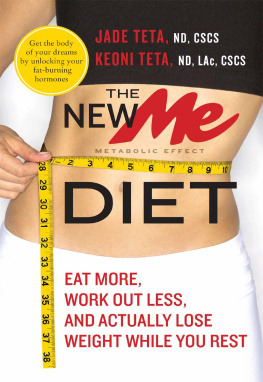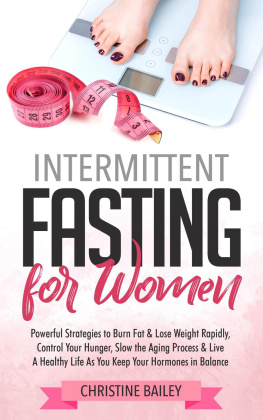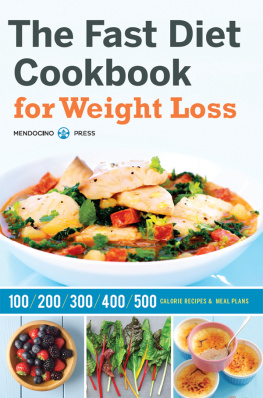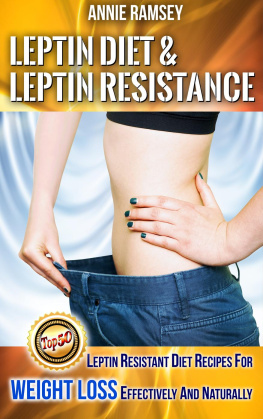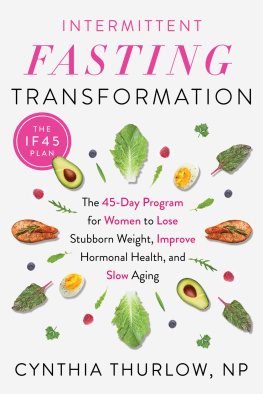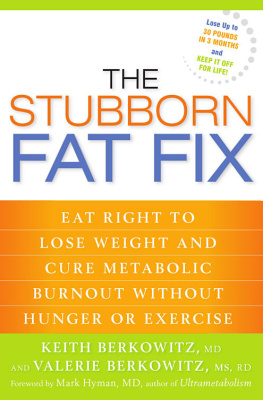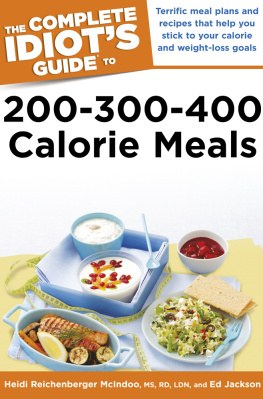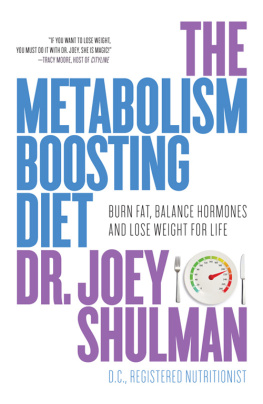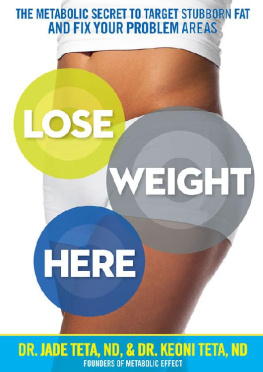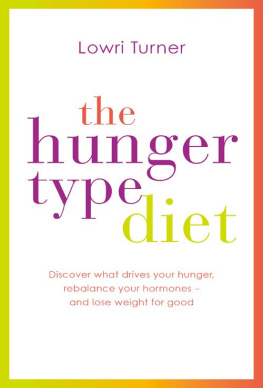This book is dedicated to the dream that one day nutrition and exercise will replace pharmaceutical drugs as the cornerstone of a physicians education and will be used as the first line of defense for both the treatment and prevention of disease
Everyone knows how to get fit and lose weight: pedal your way through a 45-minute spinning class, spend 30 minutes like a hamster on the elliptical machine, or sprint on the treadmill 4 times a week. Oh, and go on a diet. Calories in. Calories out. Watch and weigh every morsel that goes in your mouth.
The problem with this low-calorie, aerobic-exercise model?
It doesnt work.
Are you shocked? Fitness experts have been telling us for decades that vigorous, one-size-fits-all aerobic exercise is the only way to reach optimal weight and muscle-to-fat ratio, i.e., to lose weight and look good.
The truth is that the typical aerobic-exercise program and calorie-counting diet burns muscle not fat. And fat is what you want to lose. In addition to making you look better, only fat loss has the power to restore a damaged metabolism and create lasting changes.
As holistic physicians, biochemists, and certified personal trainers, we know that the best way to get a lean, fit, and toned body lies with the ME Diet, a revolutionary approach to diet and exercise that requires just 30 minutes 3 times per week. Not only is the ME Diet supported by studies in physiology and fitness journals, but it has helped thousands of our clients accomplish weight loss and fitness goals beyond their dreams. How did this all come about?
Even though were brothers and have been physically active since we were little boys, weve each had our own struggles with weight. In our Italian-American household, pasta was served at least 4 times a week, and our health-conscious mother rarely allowed us and our other siblings to have sweet cereals, soda, or fast food. A trip to McDonalds was a rare treat. Despite eating the same things when we were kids, we have very different body types. Jade tends to be heavier, while Keoni has always been thinner. Jade struggles to keep fat off his body; Keoni works to build muscle. Jade craves coffee and sweets; Keoni couldnt care less. Jade can drink five shots of espresso and sleep like a baby. If Keoni even smells a cup of coffee, hell be awake for two days! On a cross-country driving trip, Keoni once drank a cup of coffee and was so wired that we had to pull over and let him run sprints. Despite sharing a similar genetic makeup and an identical diet growing up, weve always been aware of the differences between our metabolisms.
As we grew up and became interested in sports and fitness, we experimented with all kinds of diets. We tried carbing up before track meets. We drank 3,000-calorie protein shakes to gain weight for football. We researched and experimented with performance-enhancing diets and exercise programs. Some of our experiences seem comical when we look back at our efforts. We remember when Keoni was the fastest long-distance runner in the county during junior high school. Once at the county championships, Keoni scarfed down a large order of McDonalds french fries 30 minutes before a race. When the pistol fired, he took off and set a blistering pace but his legs began to shake during the last mile. He tried to push through until his legs became so heavy they just wouldnt cooperate. With the finish line in sight, Keoni seemed to be moving in slow motion, zigzagging all over the track with a look of horror on his face. As he weaved and wobbled, one racer after the next passed him. When he practically crawled over the finish line, our father looked at him in disbelief and said, Jeez, son, what happened to you out there? That was one of our first lessons in how food impacts performance.
Because of our fascination with nutrition and exercise, we became personal trainers in high school and developed dieting and fitness programs for our friends. We followed the standard thinking of the dayeat foods low in fat and high in carbs, and get plenty of aerobic exercise. It soon became obvious to us that this approach didnt work with most people. Even those who initially lost weight gained it all back and then some. At first, we assumed these people just werent being compliantthey were not working out and were overeating. Like everyone else, we were taught that successful and permanent weight loss was simply a matter of genetics. Some people had either fast or slow metabolisms, and nothing could be done about it.
As with our research on performance nutrition, we studied and experimented with weight-loss programs as well. We tried every diet we knew of or heard about from our clients. We became vegetarians. Then we ate only raw foods. We tried low-fat and low-carb diets, calorie-counting programs, and juice fasts. But none of them worked when it came to permanent weight loss.
Going away to college and getting undergraduate degrees in biochemistry was the best thing that ever happened to us. Biochemistry, the study of chemistry in the human body, explains the reactions that occur within the body and how it uses food. Biochemistry taught us that the body does not act like a furnace, as the calorie-counting approach to food suggests. We learned that if youre lacking a certain vitamin or mineral, your metabolism slows down. If cell membranes are covered with the wrong types of fat, your metabolism falters. We found that if you eat sugar, your body releases hormones that make you store fat. With biochemistry we finally had an explanation for the differences in our bodies and a template for how the body really works.
We then observed how amateur and professional athletes trained, noting that the leanest athletes engaged in higher-intensity activity of shorter duration and ate more, not less, food. It was soon obvious that weight loss and fat loss are not the sameit is each persons individual biochemical reactions to exercise and food that drive fat burning or fat storage. In other words, just because someone burns calories or loses weight doesnt mean he or she is losing fat. We found that people who followed a low-calorie, high-aerobic program lost much needed muscle, rather than unnecessary body fat, which led to a less efficient metabolism in the long run.
When applying to medical school, we knew that our passion for fitness would become our profession, but we were shocked to learn that doctors receive absolutely no training in exercise and fitness, and almost no instruction in nutrition. We decided to attend Bastyr University, one of the few American medical schools specializing in holistic medicine, where nutrition and fitness are at the center of the program. After learning how the body reacts to hormone imbalances and uses a communication network to regulate its functions, we understood that hormones carry instructions to the cells, telling them how to behave and whether to release or hold on to fat stores. The types of calories are thus more important to hormones than the amount of calories, and certain compounds in food act like hormones themselves, interacting directly with human physiology and genes.
When we put this knowledge to work as personal trainers, we discovered that athletes train in a way that creates an optimal hormonal response in which the quality, not the quantity, of exercise and food is the driving factor in their success. Exercise and food carry information and instructions for the body, much like computer software. Some programs tell the body to store fat, while others signal it to burn fat. The messages sent depended on the individual nutritional makeup of each food or the specific type of exercise.
The more we used and tweaked these techniques, the more we saw our clients achieve consistent and sustained results. They lost inches, became more toned, built muscle mass, and looked more like athletes. They told us that they felt and functioned as if they were years younger.

